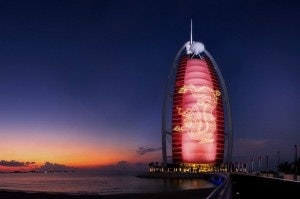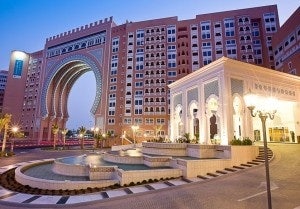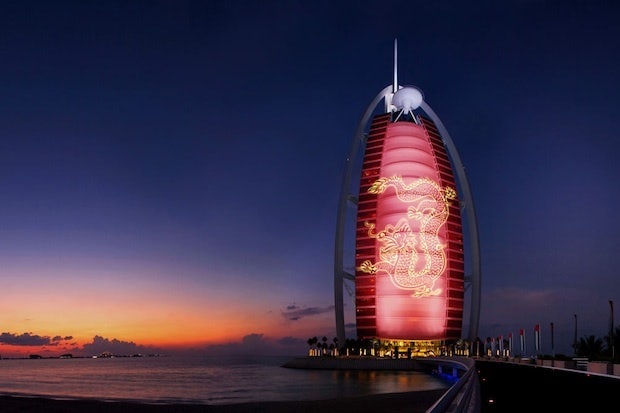Among Chinese Tourists, 193,000 Hotel Stays Recorded In Q1 2012#

Alongside predictable vacations to Paris, New York and London, Chinese tourists are now venturing further afield, making them an important new tourist base in places like Dubai. Famously attractive to newly wealthy tourists from places like Russia, Chinese tourists are now among the top 20 demographics visiting the sheikdom and make up an estimated 20 percent of all foreign tourists there. As a result, Dubai's lavish hotels and malls are moving quickly to ensure they extract as much cash from these visitors as possible.
According to figures released this spring by Dubai's Department of Tourism and Commerce Marketing (DTCM), so far this year Dubai has registered a 27 percent increase in the number of hotel guests from China, recording a total of a total of 193,000 stays in the first quarter of the year. However, as DTCM official Saleh Al Geziry noted, when taking into consideration Chinese visitors staying with friends or relatives in the UAE, the number of visitors from China is far higher. Last year, 214,000 Chinese tourists traveled to Dubai, according to Jones Lang LaSalle, a nine-fold increase from 25,000 visitors in 2001. Year-over-year through early May 2012, Chinese arrivals in Dubai have surged 50 percent, giving retailers ample impetus to cater to this important tourist segment.
What all this means is a sales boost for luxury retailers, who count on a stream of Chinese businesspeople and tourists to buoy sales. A recent poll of high-end retailers at Dubai's sprawling Mall of the Emirates released this week notes that Chinese tourists' shopping habits "trend towards an interest in luxury products including branded leather goods, handbags, footwear, and specialised beauty products not available in China." The survey finds that Chinese tourists in Dubai tend to be somewhat savvy and informed shoppers, "with a keen eye for luxury brands and products." As Tanya Atkinson, GM of Harvey Nichols Dubai, observed, "Chinese tourists are seeking the most internationally recognizable brand names in the store, such as Armani Collezioni, Balenciaga, Bottega Veneta, Coach, Dolce & Gabbana, Gucci, and more."
To cater to these tourist-shoppers, as we've seen from Spain to Singapore, the Mall of the Emirates has been on a recruiting kick, hunting for Mandarin- and Cantonese-speaking sales staff. As one (unnamed) luxury retailer is quoted in the mall's survey, "We have recruited to a profile to meet our customer needs, including more Chinese staff." Another added that they "have Chinese team members covering all shifts." Atkinson of Harvey Nichols Dubai further added, "Chinese tourists are an important focus, and during key travel period for Chinese tourists we employ a Chinese speaking team member to greet arriving shoppers," pointing out that the store "includes Chinese language signs at key touch points throughout the store." Like other major retailers popular with visiting Chinese tourists, including Bergdorf Goodman in New York City, Harvey Nichols Dubai tailors window displays for holidays like Chinese New Year, while the mall itself has added multilingual services and programs to assist Chinese (as well as other foreign) tourist groups.

Notorious for scrimping on accommodations while splurging on shopping, Chinese tourists in Dubai appear to be more open to shelling out for high-end hotels than in some other destinations. As China Daily wrote last month, the most popular hotels in Dubai among Chinese outbound tourists are the seven-star hotel Burj Al Arab (where 30 percent of guests in the first three months of this year were Chinese), the 1537-room luxury resort Atlantis The Palm and the Ibn Battuta Gate Hotel. According to Yasmine Hidalgo, PR manager at the Ibn Battuta Gate Hotel, Chinese guests make up the third-largest contingent at her hotel, adding that Chinese guests "like the proximity to the Ibn Battuta shopping mall and of course our Chinese restaurant Shangai Chic. Our visitors from China like the sun, beach and lifestyle of Dubai, but at the same time they also like to feel at home."
As the New York Times recently noted, not only are Chinese visitors coming more often, they're staying in Dubai longer. Citing data collected from hoteliers by the Majid Al Futtaim group, the Times notes that Chinese tourists are now spending an average of four nights in Dubai, over three nights two years ago. However, the famous pragmatism for which Chinese tourists are becoming notorious in the hospitality industry continues to shine through.
According to Majid Al Futtaim CEO, Peter Walichnowski, Chinese tourists will often spend one of their four nights in Dubai at the $2,100-per-night Burj Al Arab hotel, spending their remaining nights at “obscure two-star hotels to maximize [their] stay.”
